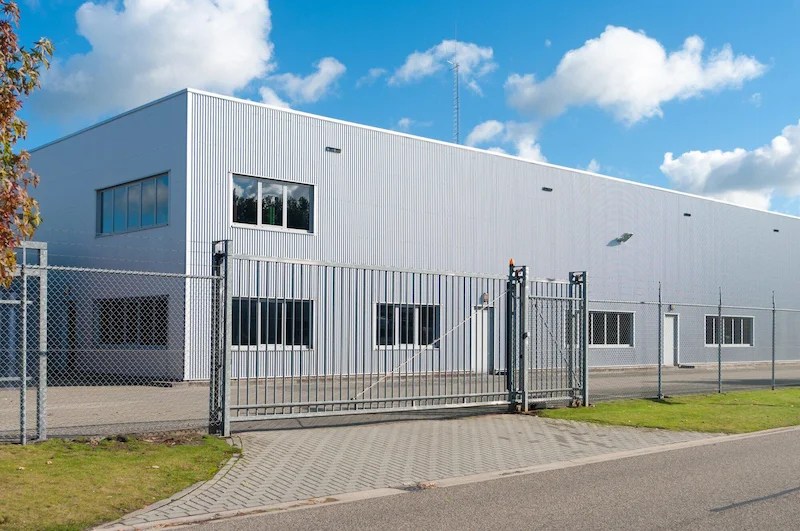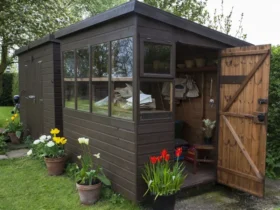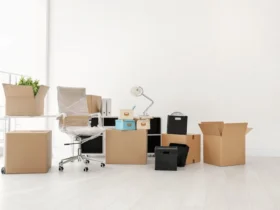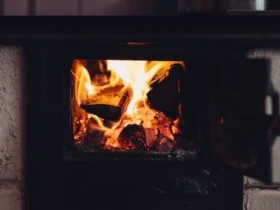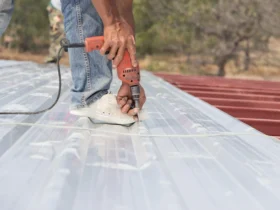In the hustle and bustle of commercial ventures, securing the premises is a paramount concern. Complexes require physical perimeters that exude robustness and resilience.
When it comes to long-lasting commercial fencing, the choice of material is an essential decision. Such a decision directly impacts the security, aesthetics, and maintenance of the property.
This comprehensive guide navigates the landscape of fencing materials designed for the rigors of commercial use. We’ll steer you through each of the options. That way, we can help you make an informed choice that will safeguard your business for years to come.
Let’s begin!
Steel Fencing
Steel is the most reliable and sturdy fencing material. It’s ideal for commercial properties that require high levels of security. Steel fences are difficult to:
- climb
- cut
- break
This makes them an excellent deterrent for intruders. However, steel fences can be heavy and expensive to install compared to other materials like wood or vinyl.
Regular maintenance is necessary as they are prone to rust and corrosion. However, the durability and strength of steel make it a popular choice for industrial applications.
If you opt for steel fencing, you can customize the design to suit your needs. Steel fences can be made in various styles. It can range from plain steel bars to ornamental designs.
Apart from its strength and versatility, steel fencing also offers a sleek and modern look. It’s what enhances the overall appearance of your commercial property.
Aluminum Fencing
Aluminum is another popular fencing material that offers a balance of strength and affordability. It’s lightweight. Thus, making it easier to install and transport.
Aluminum is also resistant to rust and corrosion. This will then help reduce its maintenance costs. However, aluminum fences are not as robust as steel. They can be easily bent or damaged in extreme weather conditions.
They are also less private compared to other materials. This is because they offer limited privacy options. Take note that aluminum fencing is not suitable for high-security commercial properties. It’s best suited for smaller businesses or decorative purposes.
Vinyl Fencing
Vinyl is a durable, low-maintenance fencing material that can withstand harsh weather conditions. It’s also resistant to:
- rot
- rust
- pests
This makes it an excellent long-term investment for commercial properties. Vinyl fences come in various designs and colors.
It allows businesses to choose the perfect option that complements their property’s aesthetics. They’re also quite simple to install and need little maintenance. Thus, saving businesses time and money.
However, vinyl fences may not be as robust as steel or aluminum. They can crack or become discolored over time due to exposure to the sun’s UV rays. Vinyl is also less resistant to impact. This makes it a less ideal choice for high-security properties.
Chain Link Fencing
Chain link fencing is a budget-friendly and versatile option for commercial properties. It’s easy to install, requires minimal maintenance, and offers various privacy options depending on the mesh size.
However, chain link fences may not offer as much security as other materials, as they can be easily cut or climbed. They also have less aesthetic appeal compared to other fencing materials.
Wrought Iron Fencing
Wrought iron is a classic and elegant fencing material that offers both security and beauty. It’s durable, resistant to rust, and can be customized to fit any commercial property’s design.
However, wrought iron fences can be expensive to install and maintain compared to other materials. They also require regular upkeep to prevent rust and corrosion.
Wood Fencing
Wood is a traditional and cost-effective fencing material that adds warmth and natural beauty to commercial properties. It’s also customizable, as businesses can choose from different types of wood, designs, and finishes.
However, wood fences require regular maintenance to prevent rot, warping, and pest infestations. They are also less durable compared to other materials in extreme weather conditions. Professional installers from sites like toprailfence.com can help businesses choose the right type of wood and maintain it properly to ensure its longevity.
Composite Fencing
Composite fencing is a blend of wood fibers and recycled plastic, offering the best of both worlds. It’s durable, low-maintenance, and environmentally friendly.
Composite fences come in various styles and colors, mimicking the look of real wood without the maintenance issues. However, they can be more expensive than other materials initially.
Plus, the composite material may not be as strong as steel or aluminum, making it less suitable for high-security properties. This type of fence is best suited for businesses that prioritize sustainability and aesthetics.
You may like – 4 Signs You Need Termite Spot Treatment ASAP
Concrete Fencing
Concrete is a durable, low-maintenance, and long-lasting fencing material. It’s resistant to rot, pests, and extreme weather conditions, making it ideal for high-security properties.
However, concrete fences can be costly and time-consuming to install compared to other materials. They also offer limited customization options in terms of design and color.
Fiberglass Fencing
Fiberglass is a lightweight and durable fencing material that offers high levels of security. It’s also resistant to rot, rust, and pests, making it ideal for harsh environments.
Fiberglass fences come in various designs and colors, allowing businesses to choose the perfect option for their property’s aesthetics. However, they can be more expensive than other materials initially and may require professional installation.
HDPE (High-Density Polyethylene) Fencing
HDPE fencing is a durable and environmentally friendly choice for commercial properties. It’s resistant to rot, rust, and pests, making it a long-lasting investment.
HDPE fences come in various designs and colors, offering businesses the option to customize their fencing while maintaining high levels of security. However, they can be more expensive than other materials initially.
Invest In Long-Lasting and Durable Commercial Fencing Materials
Choosing the right material for commercial fencing is crucial in ensuring the safety and security of your property. Each material comes with its own set of pros and cons. But, it’s crucial to weigh factors such as longevity, upkeep, price, and appearance before deciding.
With this comprehensive guide, we hope to have helped you understand the different options available for commercial fencing. By investing in high-quality and long-lasting fencing materials, you can safeguard your business for years to come.
Remember, a strong and secure perimeter is the first defense against potential threats to your commercial property.
If you’d like to delve deeper, check out our primary blog section.


